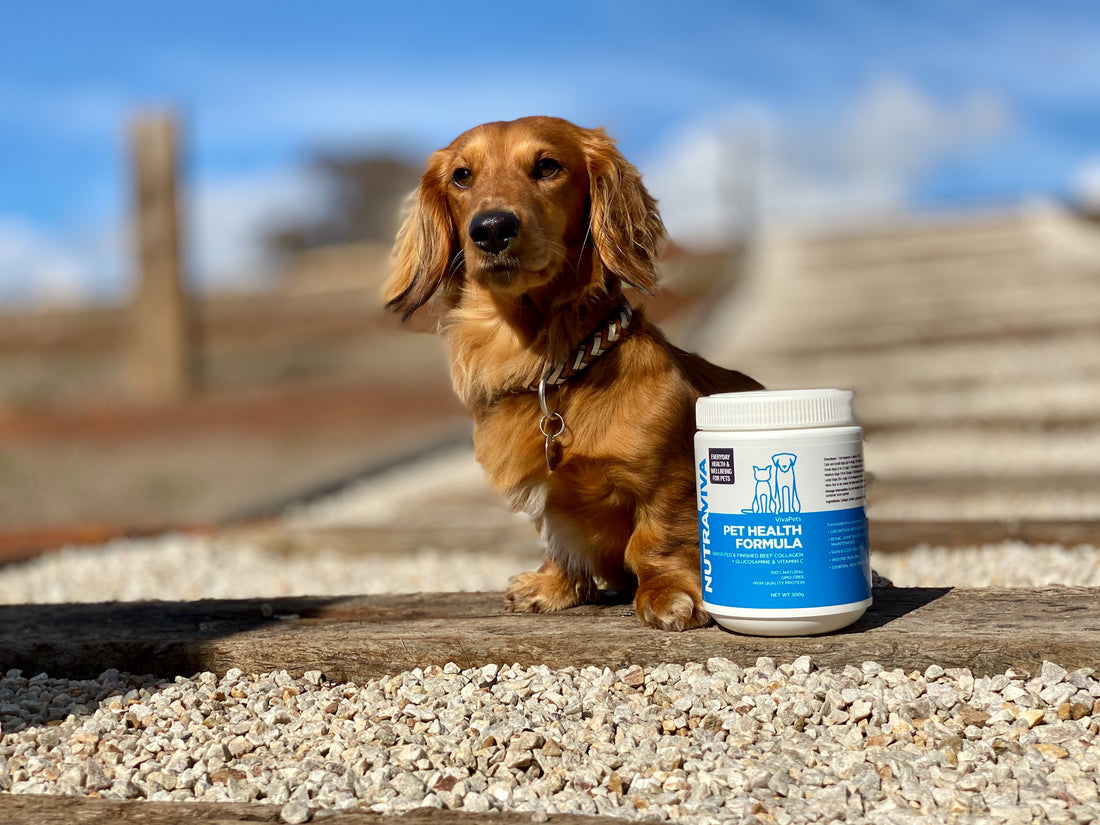5 Key Benefits of Collagen for Pet Health
Collagen is the main structural protein found in skin and connective tissues like joints, tendons, cartilage, and ligaments. Approximately 30% of the total protein in a dog’s body is collagen with this important protein determining the strength and elasticity of an animal’s hair, bones, nails, and teeth. Is it no wonder then that collagen supplements can benefit our furry friends and not just our own bodies?
As our pets age, their capacity to produce collagen diminishes thus making them more susceptible to injuries, painful conditions of the bones and joints, as well as poor skin and coat health. Our pets also age more rapidly than we humans, with collagen protein depleting rapidly and often leaving your pet with health issues such as joint pain and arthritis. By providing additional collagen in your dog’s diet, the more likely you are to reduce the potential for such problems.
The 5 key benefits to collagen supplement benefits for our pets are:
1. Joint Stabilisation
Collagen makes up 70 to 90% of a dog’s muscles, tendons, and ligaments. As muscles and connective tissues loosen and become more brittle with age, dogs can become susceptible to injuries including torn cruciate ligaments, patellar subluxations, and elbow and hip dysplasia. Adding collagen to your pet’s diet may assist with improved joint health and injury prevention. In larger dog breeds particularly, such as Labradors, collagen supplementation may be beneficial in the prevention of breed related serious joint issues such as elbow dysplasia developing.
2. Decreased Joint Pain
Like humans, age-related joint and soft tissue pain is something that many dogs will experience in varying degrees as they age. Collagen loss in the joints that occurs during aging can be a factor in arthritis, degenerative disc disease and tendonitis. It is suggested as a safe and effective supplement for joint health both for both humans and animals. It has been and can further be used standalone or as an complimentary therapy and osteoarthritis management for our companion animals.
3. Digestion Support
Collagen aids in digestion by breaking down proteins and soothing the lining of the gut. It supports the health of the protective lining of the gastrointestinal tract by helping to form connective tissue and infusing the whole system with restorative amino acids.
Glycine is one of the many amino acids contained in collagen. It has been shown to have soothing properties that help promote an overall healthier, less agitated digestive system for your dog.
4. Promotion of Hair, Nails & Coat Health
70% of the protein in your dog’s skin is collage;, it is responsible for providing healthy skin, a soft, shiny coat and strong, powerful nails that are less likely to split as they grow.
5. Inspires a Healthy Appetite
Collagen is most effective when consumed through food or supplements. Dairy, eggs and lean meats are excellent sources of collagen protein and should form part of our companion animal’s healthy diet. Collagen supplementation may also assist in the uptake of collagen stores for our pet’s bodies.
Find out more about the benefits for collagen for pet health here.
Shop now for Nutraviva’s specialised pet formula range.
References
Hasan Gencoglu, Cemal Orhan, Emre Sahin & Kazim Sahin , 4 April 2020, Undenatured Type II Collagen (UC-II) in Joint Health and Disease: A Review on the Current Knowledge of Companion Animals. Department of Biology, Faculty of Science, Turkey. Department of Animal Nutrition, Faculty of Veterinary Medicine, Turkey. https://www.mdpi.com/2076-2615/10/4/697/htm.
Simón Martí-Angulo, Núria García-López &Ana Díaz-Ramos, 2014 December, Efficacy of an oral hyaluronate and collagen supplement as a preventive treatment of elbow dysplasia. Journal of Veterinary Science. https://www.ncbi.nlm.nih.gov/pmc/articles/PMC4269601/.
Michael Schunck, Helen Louton & Steffen Oesser, July 2017, The Effectiveness of Specific Collagen Peptides on Osteoarthritis in Dogs-Impact on Metabolic Processes in Canine Chondrocytes. Collagen Research Institute, Kiel, Germany.Department of Veterinary Sciences, Institute of Animal Welfare, Animal Behavior, Animal Hygiene and Animal Husbandry, Faculty of Veterinary Medicine, Ludwig-Maximilian-University Munich, Munich, Germany. Open Journal of Animal Sciences. https://www.scirp.org/journal/paperinformation.aspx?paperid=77445.
Written by Bruno Rossitt, Founding CEO Nutraviva, BEd(PhysEd)


